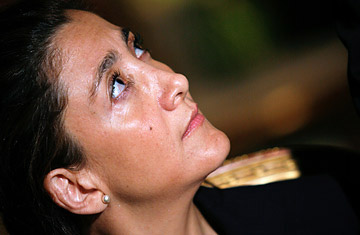
Freed hostage Ingrid Betancourt
Within hours of political hostage Ingrid Betancourt's rescue on July 2, the publishing industry was already buzzing about a major book deal for her. But one of Betancourt's many surprises upon her release after six years of imprisonment was finding out that she had already written a best-selling book, without even knowing it.
In November, during the arrest of several FARC guerillas in Bogota, Colombia, the police confiscated a video of Betancourt as well as a 12-page letter that she had written to her mother and family last year as proof that she was still alive. The poignant letter, penned in cramped handwriting, was immediately published as a book in France, where Betancourt grew up, and quickly became a best seller. An English edition was published by Harry N. Abrams in the U.S. this May.
Now Abrams is rushing out a second printing of Letters to My Mother ($14.95). Says Michael Jacobs, president and CEO of Abrams, "We wanted to help get the word out about Ingrid's plight, and now her release is clearly helping to sell the book." The slim volume, the first document written by Betancourt, 46, about her captivity, is a coup for the New York City publisher. It contains a passionate foreword by Nobel Peace Prize laureate Elie Wiesel, who pleads, "In the name of her humanity, and of yours, I implore you to listen to this voice." It also contains a loving response from her son and daughter, who were electrified by the unexpected proof that their mother was still alive.
Letters shows a woman who has, like an older version of Anne Frank, retained her faith in humanity against all the evidence, and whose love for her family supports her. Her deep sense of faith has also sustained her. "I am in communication with God, Jesus and the Virgin every day," she writes. Which is not to say that Betancourt did not suffer mightily. "Morning overcast, like my spirit," she opens. "My beloved and divine Mamita [her pet name for her mother] of my heart...Every day I pray to God to bless you, to care for you, protect you, and allow me the opportunity to one day indulge you in everything, to please you in everything, to have you like a queen close to me; since I cannot bear the thought of being separated from you again."
Betancourt describes a brutal enslavement: "I haven't being [sic] eating; my appetite has shut down; my hair is falling out in clumps; I have no desire for anything...Here, nothing is one's own, nothing lasts; uncertainty and precariousness are the only constant. The order is given at any moment to pack up and one gets to sleep stretched out anywhere like an animal. Those are the particularly difficult moments for me. My palms sweat, my mind gets foggy, and I end up doing things twice as slowly as normal. The marches are a calvary because my luggage is very heavy and I can't handle it."
Variety reported this week that Hollywood has already come knocking, eager to film the real-life drama. But for the person who wants to know what Betancourt and her fellow hostages went through in real time, this small book, written in the "green prison of this jungle," offers a moving first stop.
